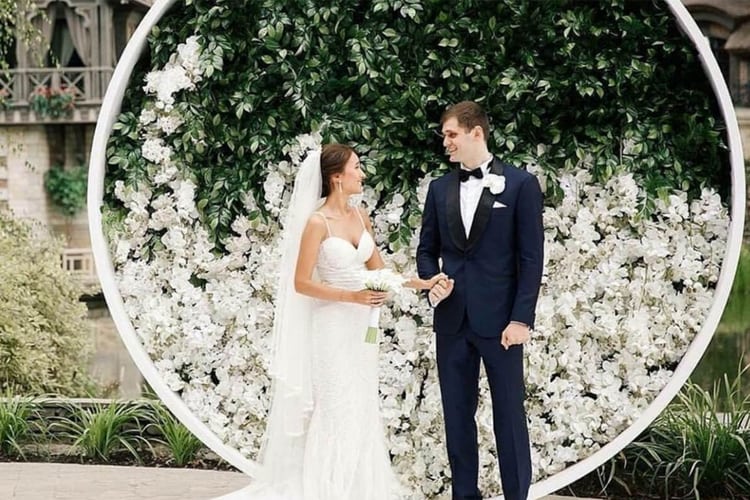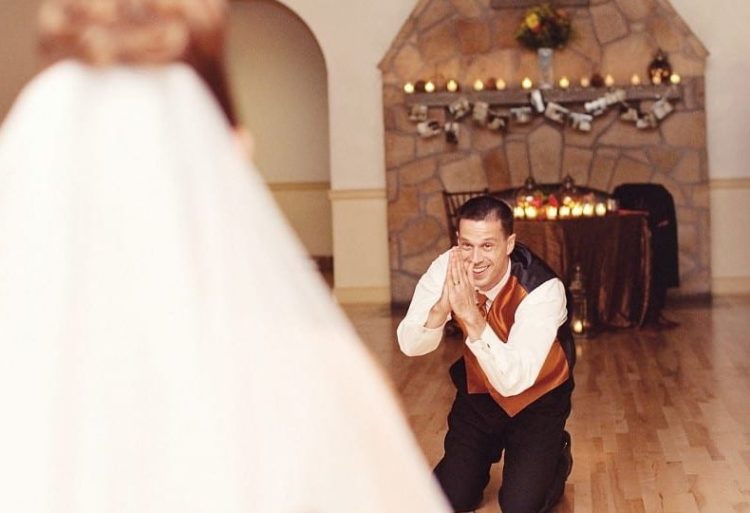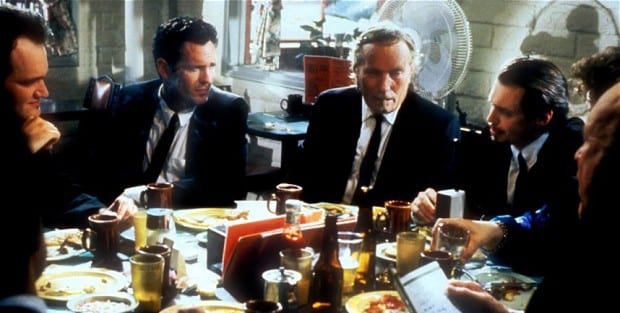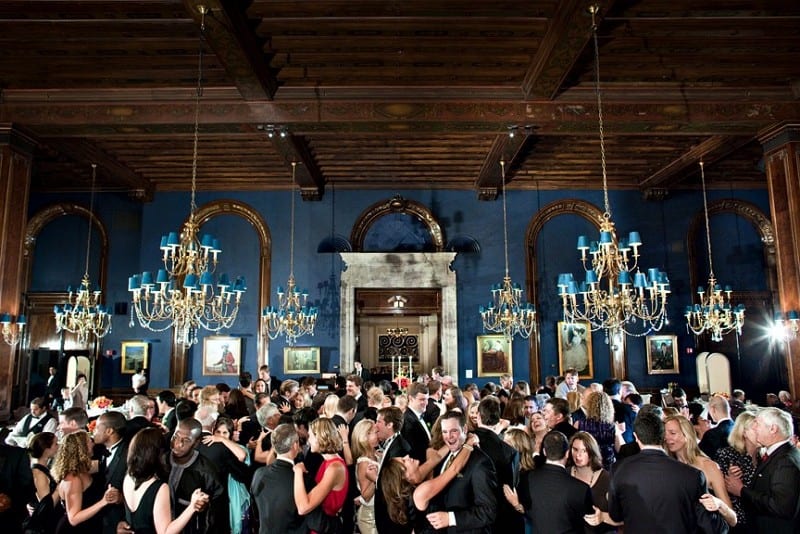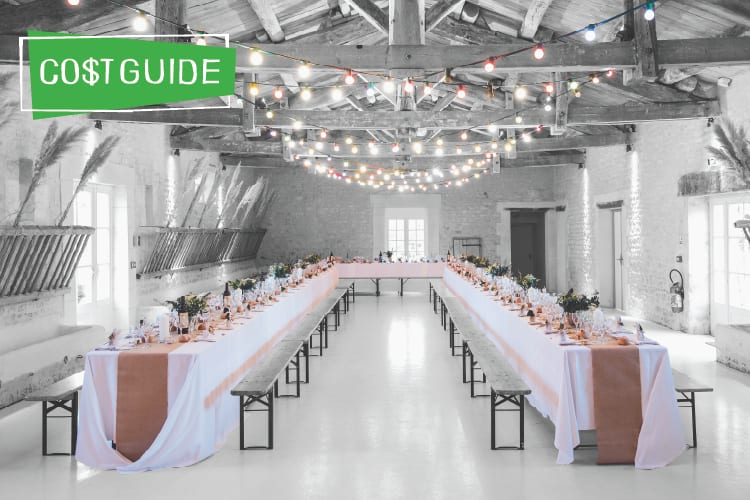
Besides finding the right spouse, your wedding venue (ceremony and reception) is arguably the most important element of your wedding day. If you’re doing it the usual way, the venue will be your single largest expense — the average cost of a U.S. wedding hovers near $30,000. The average venue cost? Half that: $15,163. Nevertheless, it’s often the most variable expense — if you’re having the entire event in your parents’ backyard, the use of the space is free (depending on familial relationship). The Loeb Central Park Boathouse in New York City, on the other hand, will run you about $50,000. Below are some other factors that make an impact on the cost of renting a wedding venue.
How Many People Are Coming?
The size of your guest list is the single greatest determinant of where you’ll have your wedding. Not surprisingly, bigger venues cost more than smaller venues, but the exact cost will vary wildly depending on what neighborhood, city and region of the country you’re in. Though you’ll be asked to pay a flat fee for the venue itself, you can expect to pay additionally per person if the place requires you to use their catering or other services (like linens, sound systems, waitstaff, florists and entertainment). Some venues that require you to use their wedding services will waive the “location” fee anyway — they know they’re going to make that money back, and then some, on the food and liquor.
When’s The Wedding?
June weddings may be a cliché, but they’re still also pricier — you’re competing for the limited number of locations that can host weddings during popular summer months, and the venues will set rates to reflect demand. The same goes for weekend versus weekday weddings — everyone wants to get married on a Saturday. So to save money, ask about the price on weekdays in non-summer months.
Will the venue host both the ceremony and the reception? Or is the ceremony in a church or synagogue?
If you’re having an old-fashioned church wedding, you’ll have to have the reception somewhere else, and pay the church fee or donation on top of the price for a reception venue. (Depending on many factors, church weddings can cost as little as $100 for a small chapel to $3,000 for a cathedral.) Venues won’t necessarily give you a discount for having both the ceremony and the reception there, but you’ll save by reducing incidental logistical problems (you won’t have to hire a bus and driver to take guests from the church to the reception, etc.). Also note that churches may not be open to hosting interfaith marriages and may not allow secular music or readings.
Will the wedding be outdoors or indoors?
Many people imagine themselves getting married outdoors, but the reality is that the weather doesn’t always comply. If you think you’re going to save big bucks by choosing a “venue” without four walls, think again: You’ll need to have a backup plan ready in case it rains, the temperatures climb to over 100, or a snowstorm hits. If you’re hiring a venue with an outdoor and an indoor space, make sure you can use the indoor space if nature doesn’t cooperate.
City or country wedding?
City weddings cost more: There are more people getting married, less space for them to get married in, and the overall usual urban inflation. Suburban or rural weddings cost less, but you’ll have fewer venues and less variety to choose from.
Considering other types of venues?
Couples don’t just get married in places of worship and food-friendly venues. They get hitched in museums, barns, breweries, hotels, parks, gardens, and libraries. Generally speaking, these locations charge between $2,000 and $22,000, except for hotels/resorts, which can cost up to three times that.
Do you need special considerations for the elderly, handicapped or children?
All public wedding venues should be compliant with federal and state regulations regarding handicapped-accessible structures, but when you’re checking out the space in person, make sure everyone who’s coming will be able to get around safely and comfortably. Are there ramps or elevators for people in wheelchairs, or are there only stairs? If it’s outdoors, will there be suitable shade for the elderly and kids (and people who burn easily)? If children are allowed at the wedding, will they need a separate kids’ room (and a babysitter)? If the party will be outdoors, is there any dangerous wildlife parents need to know about when deciding how much free rein their kids have?
Is the venue all-inclusive or not?
Some venues require you to use some or all their services if they’re hosting your wedding, eager to push catering and liquor. Others won’t do any of that, and require you to find your own vendors. Still others are somewhere in between, insisting that you choose vendors from a pre-approved list (usually insured companies they’ve worked with before). Depending on what you have in mind for your wedding, each of these could cost you more or provide an opportunity for savings. An all-inclusive wedding, for example, gives you leeway to negotiate venue discounts that bring down the overall cost, but may force you to shell out for some expenses you don’t consider important. Having to find separate vendors for every aspect of the wedding is less efficient and quickly adds up, in terms of the both the money and the time you’ll spend. And if you venture off a venue’s pre-approved list of vendors, you may have to pay a hefty penalty fee.
Do you need to rent chairs, tent, etc?
Don’t assume that the tables, chairs, tents, silverware, plates and other necessities are included with the venue. Most places will provide them, but if they don’t, you’ll have to spend a few hundred on renting them. Ask about valet/shuttles and security too.
How long will you have?
The venue will likely be strict about when your event begins and when it ends, and if you go over that, you’ll incur an extra fee — possibly a lot. Be sure you know what the penalty is for going over the end time — it can be a good incentive for wrapping things up at the end of the night.
Who gets tipped?
Anyone who provided personal service should get a tip from you at the end of the night, including the servers and bartenders (you can provide a pool tip to the head caterer to be shared among the staff), coat-room attendants ($1 per guest) and parking valets ($1 per car).
Who does the clean-up?
Make sure you and any vendors are clear about what the venue’s ground rules are about cleaning up: how much time you/they have, who’s expected to clean what, where trash goes, and, most importantly, if there’s a penalty charge for leaving the place less than spick-and-span. Because there’s a good chance that’s going on your venue bill as well.
Biggest Mistake People Make: Waiting to book the venue.
If there’s one thing you absolutely should avoid, it’s biding your time in choosing a wedding location. In fact, it should be one of the first questions you ask yourselves after she says “yes” to your proposal. It’s not unusual for couples to book their venues a year and a half to two years before the event. If your calendar shows only nine months to a year left to find a place, you need to get crackin’ immediately, and you need to be prepared to have to settle for unpopular days (middle of the week, for example), especially if you’re getting married in the summer or fall. Make the wedding venue one of the first things you take care of as soon as you’re engaged — or you may have to be prepared to say “I do” on your weird uncle’s beet farm.











